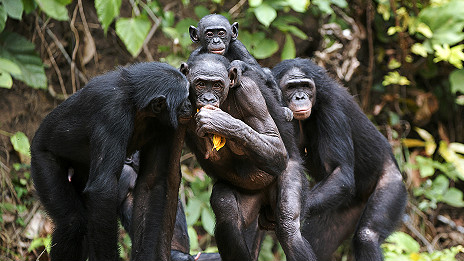媒體英語會帶大家一起學習 BBC 撰稿人在報道世界大事時常用到的單詞和短語。

Bonobos "peep" in various contexts - including feeding, travelling and resting
收聽與下載
英國和瑞士的心理學家最新研究的結果顯示,野生倭黑猩猩在遇到某些情況時會使用一種高聲調的叫聲。這個原本被認為只有人類才能掌握的技能顯示出倭黑猩猩在交流時的靈活和應變性。以下是 Jonathan Webb 的報道。
It used to be thought that apes could only make noises that were tied to their emotions such as barks of alarm or hoots of excitement. But this strange peeping sound recorded from wild bonobos appears to have more in common with the calls of human babies.
At just three or four months of age, we humans let out growls or squeals that sound the same whether we are happy or distressed. It's up to our parents to figure out what we mean from the context.
The researchers say it's the same with these bonobos peeps. An identical sound is made in happy or in neutral contexts. So instead of being unique to humans, these flexible calls apparently date back at least six million years to our common ancestor with bonobos and chimpanzees. Dr Zanna Clay from the University of Birmingham said her key observation was that the bonobos separated the sound they were making from how they were feeling.
It seems that the flexibility of our own squawks and grunts joins the growing list of abilities that we humans can no longer count as uniquely ours.
Glossary 詞匯表 (點擊單詞收聽發音)
- barks吼叫
- hoots叫喊
- growls低聲的吼叫
- squeals長而尖的叫聲
- distressed煩惱的,痛苦的
- figure out弄明白
- context環境,背景
- common ancestor共同的祖先
- squawks(人)大聲抱怨、喊叫
- grunts(人因為不滿或煩惱發出的)嘟噥,哼聲












